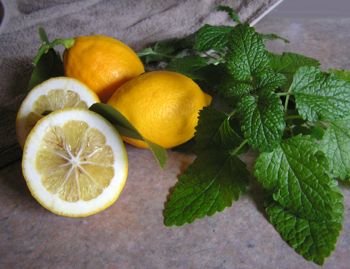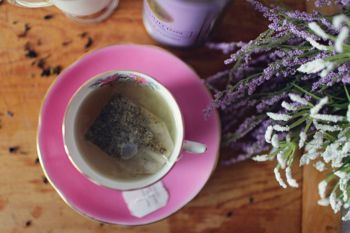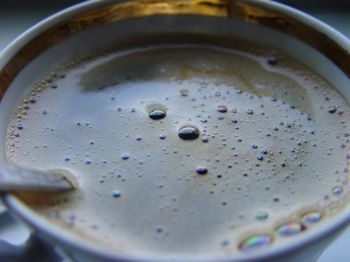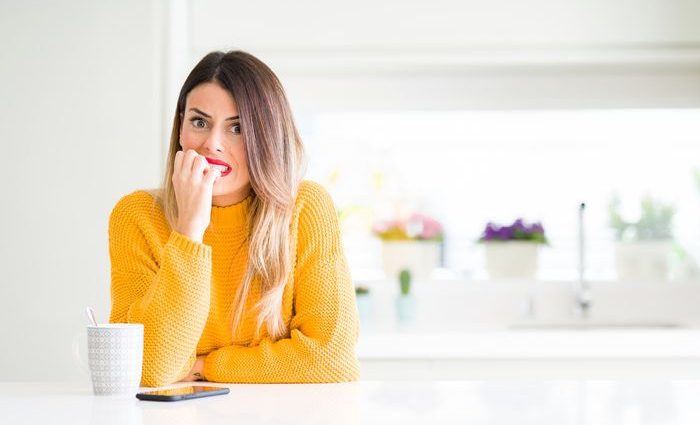Feeling anxious these days?
We’re living in anxiety-inducing times, so if you’re also experiencing a few more sleepless nights than usual, don’t worry—you’re not alone.
It can be challenging, though, to get your thoughts to turn peaceful again.
The next time you’re experiencing a sleepless night, or anytime you’re feeling anxious, try one or more of these calming teas.
 Feeling Anxious? Try 1: Black, Green, and White Tea
Feeling Anxious? Try 1: Black, Green, and White Tea
Both of these teas contain L-theanine, which is an amino acid that helps promote alpha brain waves (read: slower brain waves). When these brain waves become prevalent, you feel more relaxed and at ease.
L-theanine also boosts levels of dopamine, the neurotransmitter linked with a calm, happy mood, and is thought to help counteract the energizing effects of caffeine somewhat.
If you’re sensitive to caffeine, you may be better off with one of the caffeine-free herbal teas below, particularly before bed. Of course, you can take supplements of L-theanine—a typical dose is 100-250 mg—but the act of drinking a nice warm cup of tea can add to the relaxation experience.
 Feeling Anxious? 2: Lemon Balm
Feeling Anxious? 2: Lemon Balm
Lemon balm tea has been used for years for its calming properties, and recent research has supported that use. Lemon balm supplements are now sold specifically to help reduce anxiety.
This herb works partially because it boosts levels of GABA (gamma-aminobutyric acid), which is another neurotransmitter in the brain that reduces excitability in the nervous system. Anti-anxiety medications work similarly.
In a study on stressed volunteers with anxiety and sleep problems, scientists found that lemon balm extract, after just two weeks of use, reduced signs of anxiety by 18 percent and reduced insomnia by 42 percent.
This is the tea I often use when facing anxious nights and it works for me. It helps calm racing thoughts and also makes me feel sleepy again.
 Tame Anxiety with 3: Lavender
Tame Anxiety with 3: Lavender
Lavender is a well-known calming agent, no matter how you use it, but it makes a tasty tea that’s perfect before bed, or anytime you want to chill out a little.
In a 2017 study, scientists noted that lavender has a history of “anxiolytic” benefits (which simply means anxiety-reducing) and that these benefits were supported by clinical studies.
Lavender has two components scientists believe are responsible for its anti-anxiety capabilities: linalool and linalyl acetate. These compounds act on the nervous system in a way that promotes feelings of relaxation and calm.
In a 2019 review, researchers found that lavender significantly reduced anxiety levels. So if you’re feeling wound up, give this one a try.
You can always use lavender essential oil in an aromatherapy diffuser. Or simply place a cotton ball with a few drops under your pillow. But I find that a cup of lavender tea before bed is an enjoyable way to get your brain to quiet down for the night.
 Feeling Anxious? Go for 4: Kava
Feeling Anxious? Go for 4: Kava
This is another herb with a powerful reputation for being calming. Extracts at between 50-400 mg a day have been significantly more effective at reducing anxiety compared to a placebo.
In 2013, researchers found that kava could be used as an alternative to medications when it came to treating anxiety disorders. Over a quarter (26 percent) of participants with moderate to severe generalized anxiety disorder were in remission at the end of the study (8 weeks).
Some people may respond to kava better than others because of genetic differences. We can’t identify these differences yet, so all you can do is give it a try.
You may have heard that kava can damage the liver. But experts have now determined that this is usually due to poor quality supplements or other risk factors like excessive alcohol intake. So as long as you buy from a reputable manufacturer and your liver is healthy, your risk is extremely low.
If you’ve had a stressful or anxiety-ridden day, try a cup of kava tea. It may be just what you need.
 Can’t Sleep? Try 5: Passionflower
Can’t Sleep? Try 5: Passionflower
Passionflower has a reputation for helping people sleep better, but recently, it’s also shown promise in reducing anxiety.
In 2017, researchers reported that passionflower helped reduce anxiety in patients going to see the dentist! A dose of 260 mg of passionflower worked just as well as the anti-anxiety medication midazolam (15 mg). And it didn’t have the memory side effects sometimes reported with midazolam. If it can do that, surely it can help calm coronavirus fears, right?
Other studies have shown similar results. But this one has a sedative effect, so don’t use it if you need to drive or otherwise be alert. You can get it in tinctures and liquid extracts, as well as in tea.
Have you tried teas to calm anxiety? Let us know your favorites.

